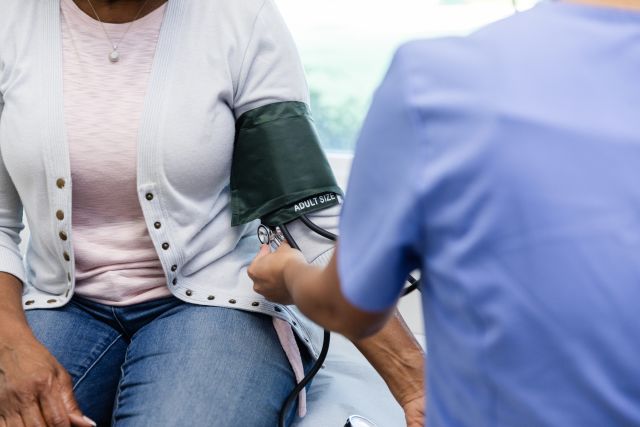Updated on March 8, 2024.
High blood pressure—also called hypertension—can develop without any signs or symptoms. You may not know that you have it, but it could be harming your blood vessels, heart, and even your kidneys and eyes.
Nearly half of adults in the United States (roughly 120 million people) have high blood pressure, but only about 22 percent of them have it under control, according to the Centers for Disease Control and Prevention (CDC).
“Hypertension isn’t something that’s always symptomatic,” says Gregory L. Miller, MD, a cardiologist in Grand Rapids, Michigan. “People aren’t alarmed. They’re feeling fine, so they’re not going to seek medical care.”
For people who know they have high blood pressure and still aren’t controlling it, Dr. Miller suggests they may have trouble getting the medical care they need. “A lot of people use emergency rooms or urgent care when they need it,” he says. Miller adds that it's is important to treat high blood pressure. Even if it is slightly higher than normal, steps should be taken to lower it, he explains.
“A lot of times we’re faulted for not trying hard enough to reach target blood pressure numbers,” he says. “We’ll say, ‘We’ve got it under 160/90 and that’s good enough,’ or, ‘The patient is elderly, and I don’t want to push too hard.’”
What is an ideal blood pressure level?
A blood pressure reading has two elements: the top number (systolic) and the bottom number (diastolic). Healthcare providers (HCPs) measure these readings in millimeters of mercury (mm Hg).
A normal blood pressure level is lower than 120/80 mm Hg. A top number of between 120 and 129 and a bottom number higher than 80 is considered elevated, or slightly higher than normal. Anything above130 on the top or 80 on the bottom is considered high blood pressure.
These are pretty solid guidelines, says Miller, but he also notes that one’s blood pressure can change frequently. Blood pressure is usually highest in the morning when there are more catecholamines—stress hormones like adrenaline—in the blood.
There’s also day-to-day variation based on things like the foods you eat, if you are dehydrated, and the weather. There’s even a phenomenon called “white coat hypertension” where people have higher blood pressure in a doctor's office, possibly due to stress or anxiety around medical appointments.
What increases the risk for high blood pressure?
There are many things that may increase your risk for high blood pressure:
- Age: Blood pressure tends to rise for almost everyone as they get older. Around 90 percent of Americans will develop high blood pressure by the time they reach between 55 and 65 years of age. Anyone older than 40 should get their blood pressure checked at least once a year.
- Race: Black American adults are at a greater risk for high blood pressure (56 percent) than Hispanic (39 percent) and non-Hispanic white Americans (48 percent). High blood pressure is also thought to develop at an earlier age in Black Americans than in other groups.
- Sex: People assigned male at birth are more likely to have high blood pressure (50 percent) than people assigned female at birth (44 percent). They are also more likely to develop it until the age of 64. People assigned female at birth are at higher risk from the age of 65 and up.
- Family history: If you have an immediate family member (like a parent or sibling) with high blood pressure, you’re more likely to develop the condition. This can be due to a mix of genetics as well as the environment and lifestyle you share with your family.
What can happen if high blood pressure is not treated?
Untreated high blood pressure can damage arteries, which can lead to plaque buildup and atherosclerosis, which is a buildup of fatty deposits in the blood vessels that can cause hardening of the arteries and increase your risk for heart attacks, strokes, and heart failure. But the consequences of high blood pressure aren’t limited to the heart and the blood vessels. It can also cause kidney damage.
“High blood pressure is a big cause and one of the few treatable causes of kidney damage,” Miller says. Kidney damage from high blood pressure is called hypertensive nephropathy.
“Everything—coronary artery disease [the most common type of heart disease], heart failure—gets worse from renal insufficiency [poor kidney function],” says Miller.
High blood pressure can damage the blood vessels in your eyes, as well. This condition is called hypertensive retinopathy. It can potentially lead to double vision, headaches, and even vision loss. High blood pressure also puts you at risk for damage to eye nerves and blockages in the blood vessels that deliver blood to the eyes.
Lifestyle changes can help lower blood pressure
Treatment for high blood pressure usually starts with monitoring your blood pressure regularly. Your healthcare provider (HCP) can do this with a simple test in their office. You can also do it from home or, in many cases, at a local pharmacy.
To start bringing down your blood pressure, changes to diet and exercise are often recommended. Your HCP can create a plan tailored for you to lower blood pressure and improve the effectiveness of other treatments.
“We’ve seen a number of people who have successfully lost weight and their blood pressure gets much better,” says Miller. “And we ask people to limit sodium [salt] because eating too much sodium [salt] increases water retention and blood pressure.”
Things you can do to help maintain a healthy blood pressure:
- Follow a well-balanced, low-salt eating plan like the DASH Diet. Try to eat more fruits and vegetables but limit salt, sugar, and saturated fats that are solid at room temperature, like butter.
- Cut back on how much alcohol you drink. Men should have no more than two alcoholic drinks per day. Women should have no more than one.
- Get regular exercise. Most adults should get at least 150 minutes of moderate-intensity physical activity each week, or at least 75 minutes of vigorous-intensity activity. They should also do muscle-strengthening exercises at least twice a week. But all movement counts and has health benefits. So, try to simply move more as you are able each day.
- Take steps to manage stress. It may be hard to ease stress if you are facing difficulties, like medical problems, or you have a lot on your mind to worry about. But small acts of self-care, or being kind to yourself can help you cope. This might include reaching out to your friends or family for support, taking a short walk to get some air, taking a quick break to listen to a song, or making a point to try and get some extra sleep.
- Maintain a healthy body weight. One of the best ways to manage your weight is to eat more fruits and vegetables—and fewer fast or processed foods and sugary drinks. Trying to be active each day, and sticking to a regular sleep schedule (going to bed around the same time each day, and waking up around the same time) can also help control your hunger and cravings.
The American Heart Association (AHA) recommends limiting your salt intake to 2,300 milligrams (mg) per day, roughly equivalent to 1 teaspoon of salt. To control or prevent high blood pressure, some people may need to consume less than this, around 1,500 mg per day or less.
For some people, diet and exercise might not be enough to reduce high blood pressure. “Most people need medication,” Miller says. There are several different medications that can help.







